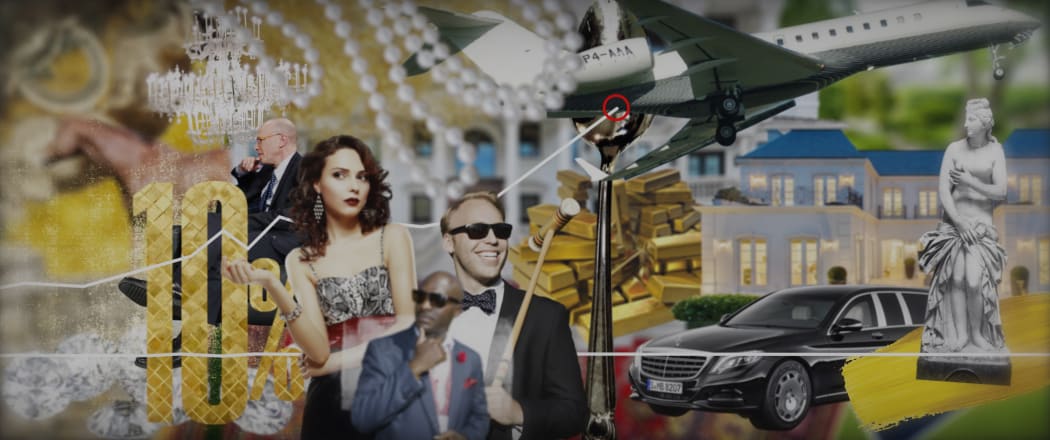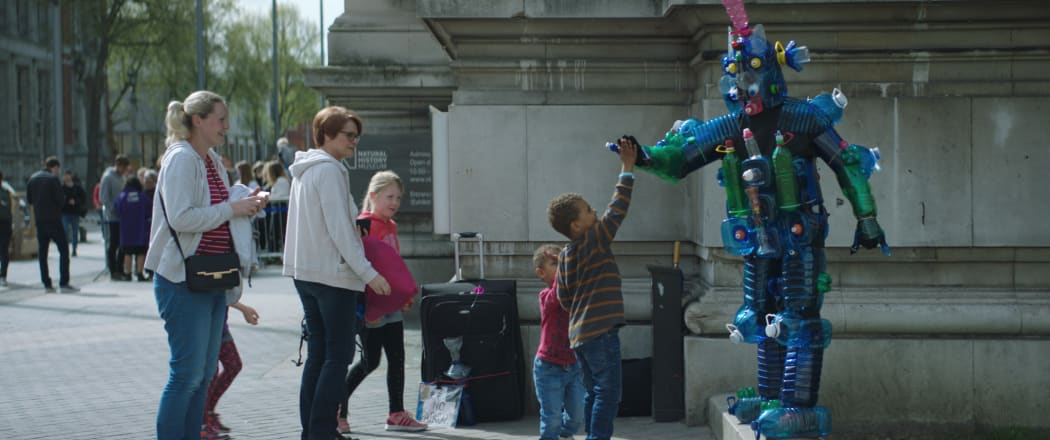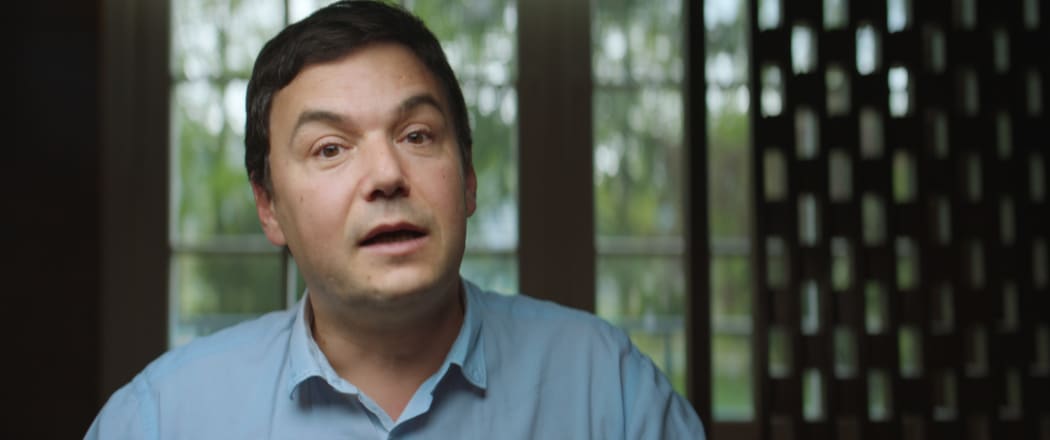New Zealand director Justin Pemberton’s adaptation of Thomas Piketty’s magnum opus Capital in the 21st Century opens in cinemas this weekend. Dan Slevin spoke to him about turning a dense economics textbook into a fast-moving documentary entertainment.

Photo: Transmission
(The interview has been edited for clarity, brevity and to make the interviewer seem more intelligent than he is. Pemberton was in need of no such assistance.)
Widescreen: How did this project land on your desk? Did it come to you or did you envision this giant doorstop of a book being a nimble fleet footed entertainment yourself?
JP: Well it was a bit of both. The person who actually pursued the movie idea was Matthew Metcalfe, the New Zealand producer. I didn’t know Matthew, but when I heard where he was going, I pursued it with a lot of passion to the point actually where he just told me to start writing and developing it. And I did that without any contract or anything. I just started ripping into it. And when I started developing it, he got more and more excited and then it went to Thomas [Piketty, the author] and Thomas read the treatment and said that he thought he was going to like it a lot. Which was a great thing to hear because that was kind of a clincher, really.
Presumably, he could have said no.
Well, there were other people wanting to make the movie, too. I believe there were at least three producers that he was talking with. So, yeah.
You know the big thing was straight away was, well this can never be the book on screen. So, what is it? And that was one of the early conversations that me and Matthew had: really the whole thing stems from Thomas’s writing, he wrapped it around stories from history that brought it alive and made it speak to people that didn’t have a background in economics and didn’t understand all the formulas. (Because there’s a lot of formulas and a lot of charts in the book.) So that was kind of where we went.
And Thomas was really interested in that because Thomas, his motivation for wanting to make a film was to make something that would talk to people who wouldn’t read the book necessarily or had bought the book and found it a little complicated or dense or didn’t quite get through it.
Well, it strikes me that Thomas’ book is a lot like Stephen Hawking’s A Brief History of Time, one of those books that everybody owns, but not many people have actually finished.
A lot of people have said that, yeah.
The Hawking book is one that everyone wanted to have on their shelf but then once they started it, they didn't realise that there was going to be so much science in it.
Yeah. And that’s what’s remarkable, isn’t it? Because I mean, Thomas was surprised himself that the book was such a success. I mean, nobody is probably more surprised than him. It is an economic textbook. It was really written for people studying economics at university level. People who had already graduated, people who were already economists, people who already were academics and intellectuals. I think that’s one of the reasons for doing the movie is because he thought that had a much broader appeal.
One of the things we talked about was how he wanted it to appeal to younger people. And he said, “You know, like I’m really looking forward to showing this to my daughter to see what she thinks.”

Photo: Transmission
Thomas has got a new book coming out this month I think [in French – the English translation will be available next year]. Another massive piece of work. Can you see a sequel on the horizon?
The new book is even bigger! This one was 700 pages and the new one is over 1100. I actually think the movie walks the ground between his two books. The new book is called Capital and Ideology and that’s actually one of the things that we’re really pursuing more in the film than was pursued in Capital in the 21st Century.
When I met Thomas, one of the times I went to his office and we sat down and we chatted about the movie and everything for a couple of hours. He was talking to me a lot about his thoughts around the fall of communism and that theft and private property were obsessions in Communism and so I knew he was going into this whole kind of thing about looking into the ideology and economics and that intersection.
I’m looking forward to getting it, I think on the 10th of March on Amazon in English. It’s going to be a big one to get through. Maybe there’s another movie. I don’t know.

Author and academic Thomas Piketty in the film Capital in the 21st Century (2019). Photo: Transmission
I was really inspired by the climate strike and how the message from those young people has very quickly become, “we are voting next.” Those young people are very aware that they’re not very far away from being having a direct impact rather than just an emotional one.
The one thing that is unfortunate though is that this [climate change] is because of Capital. I mean, the whole reason that climate has not been able to be solved by the political system is because the political system has been completely distorted and corrupted by Capital. And it has absolutely interfered with democracy in a way that’s completely detrimental. And even in countries like America, overwhelmingly the majority of the population wants action on climate, but it's not happening. It’s just not happening. Same in Brazil. It’s amazing the amount of people in Brazil who are concerned about climate change, far more than there is in the UK, and yet, look what’s happening. It is Capital that is actually preventing any kind of real progress with the climate crisis.
It has always struck me that climate change is actually an opportunity for Capital. Disruption creates markets. It’s like a war – the more things you blow up, the more society has to pay to have them replaced. So, the status quo isn’t actually all that useful for Capital, really.
Yeah. I mean it's the people that are that the owners of a very small amount that are getting in the way. It’s cartels. The energy cartels that are controlling this.
Do you see capitalism as a kind of shadowy cabal of people sort of controlling the world? Or is it more about primal forces and natural human-
Yep it’s that one. The latter.
I’ve been asked a lot about whether I see a conspiracy and I definitely don’t think there is, certainly nothing organised, but I do think it helps me to think of it as almost an invisible shape-shifting force. It is kind of organic in that sense. It’s about power and it's about how you hold onto power and it’s almost an insatiable need for people to have more, you know?
While we were making the film, I thought of Capital as a wild animal that can be really destructive when it’s just left to roam and follow its instincts but actually can be tamed and used for good and under the right circumstances. And I think that’s the thing, Thomas is not saying throw out capitalism completely, but he’s saying there’s many different sorts of capitalism and Capital itself needs to be harnessed in a way that eventually works for everyone.

Photo: Transmission
Why do you think that the great mass of people fail to see how capitalism, as it currently operates, doesn’t work in their interest? There’s this assumption that it’s just the natural way of things and, “No matter how unhappy it makes me, this is just how it is.”
I think there’s a couple of reasons for that. One of the first things is our time horizons are very short and they’re usually our children or our parents, so we don't really look.
That was one of the reasons, in the film we zoom out and fly across up to 400 years within the space of a hundred minutes to see how things have changed and history doesn't so much repeat as rhyme. So, that’s one reason. But the other reason is also the way that it’s called Marxism. Capital is also part of controlling the way that we think about what we prize, what we value, what’s important, you know? And that comes through the media or it comes through our sort of general materialistic kind of, “If we have that we’ll be happier, we’ll be happy.” So, we sort of have bought into it.
And then there’s another reason, it’s just that people are so busy and actually the more stressed you are, the less people have time to think, and thinking is so important to be able to actually have any perspective, and when you’re right there amongst the weeds, just sort of scrapping every day, you just don’t have that.
And that was the other thing for me, the film was about zooming out and almost looking back down on the world across time. That’s how I always wanted it. With the 14 interviews that I’ve done, which includes Thomas, is that it kind of narrates the story through history and into the present and then a peek into the future so that there was more of a calmness and a reflection in it.
Thomas’s (and yours too, I guess) manifesto is laid out really early on in the film, isn’t it? Which is basically that if we don’t attend to the social harm that inequality does to all of us, the last time we took our eye off the ball on this, we ended up with not just social disruption generally, but revolution and even war and the risks are incredibly high for us as a species.
Yes. That's exactly right. And even the revolutions don’t necessarily work if they’re not organised, and they don’t know what they want, which is important. That’s one thing I’d keep thinking about with the climate strike – which I 100 percent support – you know, Occupy was the same thing. And you know, ultimately going right back to the French revolution, there’s unity in knowing something's wrong and wanting to change it, but you need to be organised and know where you're going so that you get that opportunity. You’ve got a path and I think that's one of the other lessons from the film.
And even in the New World, this idea of these new flatter societies where it wasn’t dominated by aristocracy, then the pattern started to just recreate itself straight away because it was as it was (as Bryce Edwards says in the film), a very laissez faire attitude. There wasn’t a real plan for how to change things. So yes, you’re right. That’s exactly what Thomas is saying – his big alarm was that just before the global financial crisis, the level of inequality in America had reached the same levels as Europe in 1914, which lead to World War One. It’s now worse. So, we’ll see.
The way out of it historically has been revolution, wars or financial collapse. And in the biggest change, you had three in a row, you had a world war, a financial collapse and another world war, and then things changed dramatically. But I guess the point of the film in terms of hope is, we know that now! We don’t need that, [revolution] is not necessary, but it is something we need to think about.
Some people find that it’s quite a confronting and dark film. But it’s not depressing. I think it’s not depressing. I think it’s got a lot of unity and I think it’s got a lot to say.
It’s actually got quite a sense of humour.
Oh yeah, exactly. One of the editors – I work with three – when I showed him the first cut that was just basically the interviews, before the pop culture and all that stuff came in (which was always planned), the first thing he said to me was, “It could do with a few laughs.”
We made sure. I was like, “It’s always going to have this sense in it, don’t worry."
Capital in the 21st Century is playing in New Zealand cinemas now and is rated PG (violence and coarse language).

